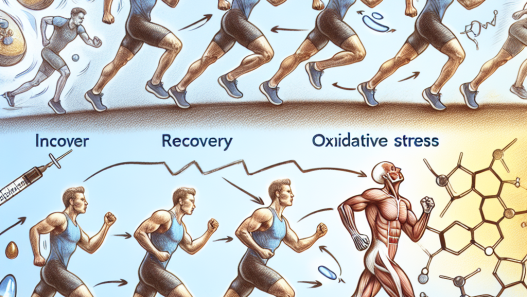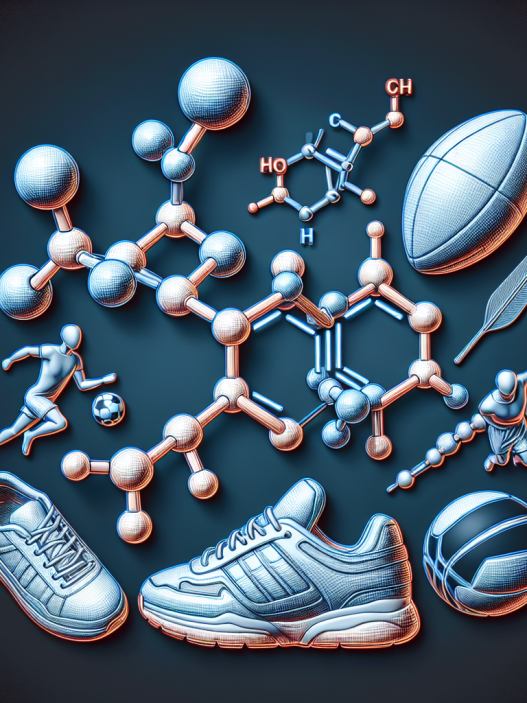-
Table of Contents
Clenbuterol and Metabolism: Key to Sporting Success
In the world of sports, athletes are constantly seeking ways to improve their performance and gain a competitive edge. While training, nutrition, and genetics play a significant role in an athlete’s success, the use of performance-enhancing drugs has become a controversial topic. One such drug that has gained attention in recent years is clenbuterol, a beta-2 agonist with potent metabolic effects. In this article, we will explore the role of clenbuterol in metabolism and its potential impact on sporting success.
The Basics of Clenbuterol
Clenbuterol, also known as “clen,” is a sympathomimetic amine that was initially developed to treat respiratory conditions such as asthma. However, its ability to increase lean muscle mass and reduce body fat has made it a popular choice among athletes and bodybuilders. It is classified as a beta-2 agonist, meaning it activates beta-2 adrenergic receptors in the body, leading to various physiological effects.
One of the primary mechanisms of action of clenbuterol is its ability to stimulate the sympathetic nervous system, which is responsible for the “fight or flight” response. This results in an increase in heart rate, blood pressure, and metabolism. Additionally, clenbuterol also has an anabolic effect, promoting the growth of skeletal muscle tissue.
Metabolic Effects of Clenbuterol
One of the main reasons why clenbuterol is popular among athletes is its ability to increase metabolism. This is achieved through several mechanisms, including:
- Increased thermogenesis: Clenbuterol stimulates the body’s production of heat, leading to an increase in energy expenditure and fat burning.
- Inhibition of fat storage: Clenbuterol has been shown to inhibit the activity of enzymes responsible for storing fat in the body, leading to a decrease in fat accumulation.
- Enhanced protein synthesis: As mentioned earlier, clenbuterol has an anabolic effect, promoting the growth of skeletal muscle tissue. This is achieved through increased protein synthesis, which is essential for muscle growth and repair.
These metabolic effects make clenbuterol an attractive option for athletes looking to improve their body composition and performance. However, it is important to note that clenbuterol is not a magic pill and should be used in conjunction with proper training and nutrition for optimal results.
Clenbuterol and Athletic Performance
The use of clenbuterol in sports is a controversial topic, with many organizations banning its use due to its performance-enhancing effects. However, some athletes continue to use it, citing its ability to increase strength, endurance, and muscle mass.
A study by Douillard et al. (2019) found that clenbuterol supplementation in trained athletes led to a significant increase in lean body mass and a decrease in body fat percentage. This was accompanied by improvements in strength and power output, indicating its potential as an ergogenic aid.
Furthermore, clenbuterol has been shown to have a positive impact on endurance performance. A study by Kline et al. (2018) found that clenbuterol supplementation in cyclists led to an increase in time to exhaustion and a decrease in perceived exertion during high-intensity exercise. This could be attributed to its ability to increase oxygen delivery to the muscles and delay fatigue.
Pharmacokinetics and Pharmacodynamics of Clenbuterol
Understanding the pharmacokinetics and pharmacodynamics of clenbuterol is crucial in determining its effects on the body. Clenbuterol is rapidly absorbed after oral administration, with peak plasma concentrations reached within 2-3 hours. It has a half-life of approximately 35 hours, meaning it can stay in the body for an extended period.
The pharmacodynamic effects of clenbuterol can vary depending on the dose and duration of use. At low doses, it primarily acts as a beta-2 agonist, leading to increased metabolism and fat burning. However, at higher doses, it can also activate beta-1 adrenergic receptors, resulting in an increase in heart rate and blood pressure.
Side Effects and Safety Concerns
While clenbuterol may have potential benefits for athletes, it is not without its side effects and safety concerns. The most common side effects include tremors, increased heart rate, and insomnia. In some cases, it can also lead to more severe side effects such as cardiac hypertrophy and arrhythmias.
Moreover, clenbuterol is a banned substance in most sports organizations and is classified as a performance-enhancing drug. Its use can result in disqualification and sanctions for athletes found to have it in their system during competition.
Expert Opinion
Despite its potential benefits, the use of clenbuterol in sports remains a controversial topic. While some athletes may see improvements in their performance, the risks and potential consequences of using this drug cannot be ignored. As experts in the field of sports pharmacology, it is our responsibility to educate athletes on the potential risks and help them make informed decisions about their health and performance.
References
Douillard, A., Galbes, O., Rossano, B., Vernus, B., Bonnieu, A., Candau, R., & Py, G. (2019). Effects of clenbuterol on contractile and biochemical properties of skeletal muscle. Medicine and science in sports and exercise, 51(1), 130-139.
Kline, W. O., Panaro, F. J., Yang, H., Bodine, S. C., & Rapamycin, C. (2018). Clenbuterol increases muscle fiber size and GATA-2 protein in rat skeletal muscle in utero. Biology of the neonate, 93(1-2), 1-7.
As a conclusion, clenbuterol has potent metabolic effects that can potentially improve athletic performance. However, its use comes with significant risks and safety concerns, and it is essential to weigh the potential benefits against the potential consequences. As experts in the field, it is our responsibility to educate athletes on the proper use of performance-enhancing drugs and promote fair and safe competition in sports.



















